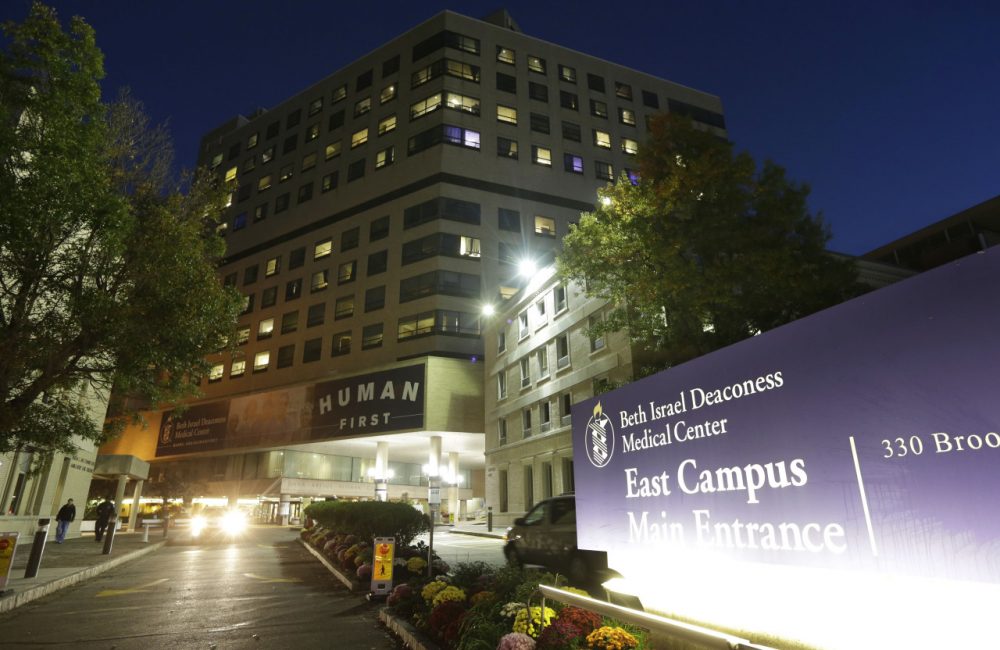Advertisement
Boston Hospitals, Even Longtime Rivals, Work Together To Manage Flow Of COVID-19 Patients

Boston hospitals, even traditional rivals, have launched a citywide group to manage capacity, so that no one hospital becomes overwhelmed with COVID-19 patients while others have beds available.
It's a bit like the Red Sox and the Yankees and other teams joining together for a common cause — heart-warming, and also a sign of true crisis.
Dr. Paul Biddinger, chief of emergency preparedness at Massachusetts General Hospital, said the voluntary group is conferring every day. It is co-led by critical care specialists from Mass. General and Beth Israel Deaconess Medical Center, he said, and all hospitals are welcome.
Mass. General belongs to Partners Healthcare, the state's largest hospital system, and Beth Israel is part of Beth Israel Lahey Health, the second-largest and a longtime competitor.
Boston is rich in hospitals, "but still, just the way patients present, one hospital can become more severely overloaded with critical illness than another one," Biddinger said. "So we've really come together to, on a daily basis, share capacity data and make sure the patients arrive or can be transferred to places with sufficient capacity to take care of them."
The group tries to direct the flow of patients rather than moving staff or physical resources around, he said.
"There have been a couple of cases so far where different hospitals have hit capacity and have been unable to care for additional critical care patients," he said, "and hospitals have stepped up and volunteered to accept either transfers or emergency department admissions."
Boston Medical Center briefly stopped accepting critical care patients this weekend, and "we're actually, I think, transferring some patients down from the North Shore today," Biddinger said. "I think it's going to be different on different days."
Advertisement
North Shore Medical Center is part of Partners Healthcare.
And the collaboration goes beyond the two biggest players. "All the Boston hospitals and thus their parent systems are talking daily and working together," said Tufts Medical Center spokesperson Brooke Hynes in an email. "They have all agreed to 'mutual aid' across their systems."
She said Massachusetts General recently transferred some babies from its Newborn Intensive Care Unit to Tufts Medical Center in order to open up capacity for adults. And Tufts Medical Center also took some Boston Medical Center patients to alleviate capacity issues there.
Boston hospitals have shared resources in the past. They actively cooperated across their usual lines immediately after the Boston Marathon bombing, but that crisis was relatively brief compared to the COVID-19 outbreak.
Biddinger praised the current spirit of working together to make sure patients end up in the right care: "It's a really nice example of everyone sort of dropping their typical affiliations."
Dr. Kevin Tabb, president of Beth Israel Lahey Health, said that recently a call came from a hospital in a different hospital system that was concerned it was running low on ventilators. "And we sent them a number of ventilators," he said. "We're working together."
"At this point, I think of us all as one big hospital system," Tabb said. "The virus doesn't respect hospital lines, it doesn't respect health care system lines, it doesn't even respect state lines. We're all in this together. That's the only way that we're going to get through it."
The American College of Surgeons is calling for cooperation to stretch beyond city and even state lines, arguing that COVID-19 care should be coordinated across whole regions.
The Massachusetts Health and Hospital Association said in a statement: "Regional coordination is an important component of the COVID-19 response being mounted in Massachusetts. We are supporting state leaders as they continue to secure locations for surge capacity across the commonwealth and track our hospitals’ supply of key resources.
Hospital leaders are convening several times a week to discuss their needs, including at the regional level. They are prepared to lean on one another in the coming weeks and are committed to working collaboratively throughout the duration of this crisis. We are operating as a united, coordinated healthcare system to ensure that resources are utilized efficiently and patients are safely treated.”